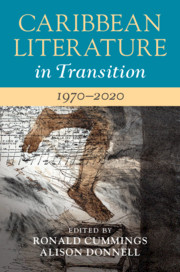Book contents
- Caribbean Literature in Transition, 1970–2020
- Caribbean Literature in Transition
- Caribbean Literature in Transition, 1970–2020
- Copyright page
- Contents
- List of Illustrations
- Contributors
- Acknowledgements
- Introduction: Caribbean Assemblages, 1970s–2020
- Part I Literary and Generic Transitions
- Chapter 1 Writing and the Responsibility to Memory: The Role of White Female Planters in Contemporary Caribbean Novels
- Chapter 2 Caribbean Identities and Diversifying the Creole Mix
- Chapter 3 Carnival, Calypso and Dancehall Cultures: Making the Popular Political in Contemporary Caribbean Writing
- Chapter 4 Life Writing, Gender and Caribbean Narrative 1970–2015: Itinerant Self-Making in the Postcolonial Caribbean
- Chapter 5 Forwarding Dubpoetry in this Generation: A Grassroots Performance and Neo-Literary Genre in Transition
- Chapter 6 Postcolonial Ruins, Reconstructive Poetics: Caribbean Urban Imaginaries
- Chapter 7 Reimagining Caribbean Time and Space: Speculative Fiction
- Chapter 8 Caribbean Drama and Performance
- Chapter 9 Here Are the Others: Caribbean Creative Nonfiction
- Chapter 10 ‘Let Every Child Run Wild’: Cultural Identity and the Role of the Child in Caribbean Children’s and Young Adult Fiction
- Part II Cultural and Political Transitions
- Part III The Caribbean Region in Transition
- Part IV Critical Transitions
- Bibliography
- Index
Chapter 2 - Caribbean Identities and Diversifying the Creole Mix
from Part I - Literary and Generic Transitions
Published online by Cambridge University Press: 16 December 2020
- Caribbean Literature in Transition, 1970–2020
- Caribbean Literature in Transition
- Caribbean Literature in Transition, 1970–2020
- Copyright page
- Contents
- List of Illustrations
- Contributors
- Acknowledgements
- Introduction: Caribbean Assemblages, 1970s–2020
- Part I Literary and Generic Transitions
- Chapter 1 Writing and the Responsibility to Memory: The Role of White Female Planters in Contemporary Caribbean Novels
- Chapter 2 Caribbean Identities and Diversifying the Creole Mix
- Chapter 3 Carnival, Calypso and Dancehall Cultures: Making the Popular Political in Contemporary Caribbean Writing
- Chapter 4 Life Writing, Gender and Caribbean Narrative 1970–2015: Itinerant Self-Making in the Postcolonial Caribbean
- Chapter 5 Forwarding Dubpoetry in this Generation: A Grassroots Performance and Neo-Literary Genre in Transition
- Chapter 6 Postcolonial Ruins, Reconstructive Poetics: Caribbean Urban Imaginaries
- Chapter 7 Reimagining Caribbean Time and Space: Speculative Fiction
- Chapter 8 Caribbean Drama and Performance
- Chapter 9 Here Are the Others: Caribbean Creative Nonfiction
- Chapter 10 ‘Let Every Child Run Wild’: Cultural Identity and the Role of the Child in Caribbean Children’s and Young Adult Fiction
- Part II Cultural and Political Transitions
- Part III The Caribbean Region in Transition
- Part IV Critical Transitions
- Bibliography
- Index
Summary
While the rich ethnic diversity of the Caribbean has been mobilized discursively in the postcolonial Caribbean as a resource to represent multicultural unity (especially in national mottoes like Jamaica’s ‘Out of many, one people’ and the Trinidadian ‘Together we aspire, together we achieve’), the social relationships between different ethnic groups have also been charged with tension and conflict. Caribbean literature in the late twentieth century represents the histories of ethnic/racial rivalries and divisions, but also the solidarities and criss-crossing creolizations that occur in everyday interactions and that mobilize class, gender, sexuality and generation as points of alliance. The recognition of literary styles and critical frameworks distinctive to Indian-Caribbean literature and Chinese-Caribbean literature has developed in the twenty-first century, although it has remained relatively understudied and theorized. These literatures must be read through the lenses of feminism, dougla identities and queer identities to sustain a fullness of their interpretations, in both scholarly and secular/societal settings.
- Type
- Chapter
- Information
- Caribbean Literature in Transition, 1970–2020 , pp. 37 - 51Publisher: Cambridge University PressPrint publication year: 2021

